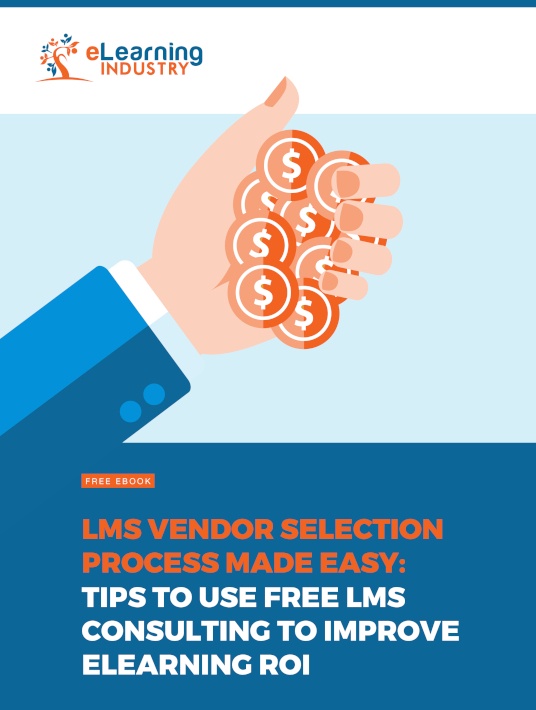How To Define The Scope Of Your Corporate eLearning Project Before An LMS Consult
Many organizations skip right to evaluating features and price points when selecting a new LMS. However, one of the most crucial aspects of the LMS implementation process is evaluating your corporate eLearning project to find the best fit. Namely, an LMS that aligns with your online training goals and L&D team talents, and helps you keep your launch timeline on track. Determining the corporate eLearning project scope also allows you to improve resource allocation and ensure that all your stakeholders are satisfied with the investment. Here are 8 tips to define the scope of your corporate eLearning project before an LMS consult.

1. Gather Input From Key Stakeholders
Stakeholders typically have certain expectations regarding a corporate eLearning project. A variety of factors come into their thought process, from budget to desired outcomes. Thus, you need to gather their input before an LMS consult to define the corporate eLearning project scope and determine what they need in a new system, as well as how quickly they expect to implement it, which gaps they want to address, and the role of the LMS in your online training strategy.
2. Reevaluate Online Training Goals And Outcomes
Your entire corporate eLearning project hinges on the online training goals and outcomes. It’s the primary reason why you’re looking for a new LMS and launching the online training course. For example, your organization needs to address pain points, improve eLearning ROI, or boost employee engagement. Now is a good time to reevaluate your online training objectives so that you can more accurately define the scope of your corporate eLearning project. Not to mention, find an LMS that offers the features and functionalities you need to achieve those objectives.
3. Know Your Organization’s Limitations
You may have a long to-do list when it comes to your online training program. But does your organization have certain limitations that stand in the way? Your current corporate eLearning project involves an organization-wide online course catalog that covers all essential tasks and compliance topics. However, you may lack the necessary resources to implement your online training strategy. Or you’re racing the clock due to new compliance regulations that you need to impart quickly. As such, you may need to scale back the corporate eLearning project to work within the confines of your limitations. Then roll out smaller corporate eLearning projects over the next year that allow for greater flexibility.
4. Evaluate Your L&D Team And Their Talents
This requires a two-pronged approach. First, you must estimate the ideal number of users so that you know how many corporate learners your LMS must accommodate. Then you need to evaluate your L&D team’s talents to determine how long the corporate eLearning project will take, what tools you require, and which Learning Management System fits the bill. At this point, it’s also wise to decide who the eLearning Project Manager will be, assign roles, and clarify responsibilities. The scope of your eLearning project relies heavily on the workload your L&D team is able to manage and how well they can utilize the system.
5. Assess Risks Realistically
Every project involves some degree of risk. A corporate eLearning project is no different. You must be able to identify those risks and determine how to mitigate them beforehand. This can help you stick to your schedule and more realistically define the corporate eLearning scope. For example, accounting for unexpected content revisions or a delay in client/stakeholder feedback.
6. Take Stock Of Resources And Set An Accurate LMS Budget
The scope of your corporate eLearning project doesn’t just pertain to the work that needs to be done, but how much it will cost. Thus, determining your price expectations up front is essential. Especially if you want to get a more accurate LMS consult. Take stock of the online training resources you already have and determine what you need from your new LMS. Then set an accurate LMS budget that accounts for the number of users, necessary features, etc. Evaluating your resources also allows you to avoid redundancies so that you can minimize spending.
7. Create An Implementation Timeline For Your Corporate eLearning Project
An implementation timeline allows you to map out every stage of your corporate eLearning project so that you can gauge it from a more holistic perspective. Include every milestone and step in the process. From doing your LMS research and vetting LMS vendors to implementing the system and launching your first online training course. You may discover that your scope is too broad based on available resources. Or that it simply isn’t broad enough to achieve all the online training objectives that stakeholders put forth.
8. Clearly Define Deliverables And Expectations
Deliverables don’t just pertain to eLearning organizations who develop online training content for clients. You also need to clearly define deliverables when you’re creating online training content and implementing an LMS in-house. Such as which online training courses or activities you must complete first to meet deadlines and stakeholder expectations. In addition, you need to outline all the online training content that’s involved in the corporate eLearning project and how long the process will take for each. A variety of factors come into play. Ranging from the skills of your team and their availability to corporate learners’ needs and the overall eLearning budget.
These 8 tips can help you determine the scope of your corporate eLearning project before your free LMS consult. The key is to get all relevant L&D team members involved so that you can explore all facets of the corporate eLearning project and gather their feedback, as well as assess their skills and talents to find a Learning Management System that gives them enough creative control to complete their respective tasks. Without delaying your launch date and complicating matters with a platform that’s too challenging to use.
A free LMS consultation can streamline the LMS vendor selection process and help you save time and resources. Fill out our quick LMS consulting request form to get a personalized recommendation list and tap into our team’s expertise.
Is defining the scope of your corporate eLearning project enough to help your LMS consultant make an accurate LMS recommendation list? Download our free eBook LMS Vendor Selection Process Made Easy: Tips To Use Free LMS Consulting To Improve eLearning ROI to discover everything you need to guide you through the LMS vendor selection process, from the importance of LMS consulting to calculating your LMS implementation timeline after you have made your final choice.






